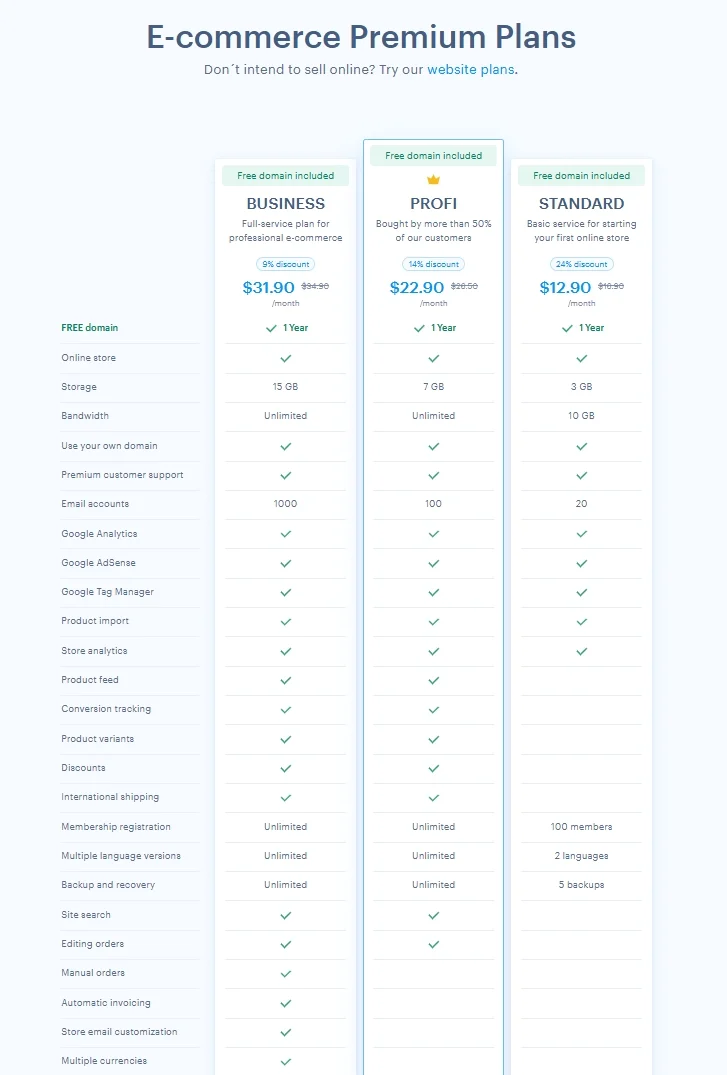If you're considering the best website builder for your online presence, Webnode vs Wix might be popular options that pop up. Both platforms provide tools to help anyone create a website without knowing how to code, yet they are not the same in what they offer.
To help you understand which platform best suits your needs, I’ve tested both Webnode and Wix to compile this comparison. And here’s my quick verdict on Webnode vs Wix based on the most important criteria that users usually look for.
Criteria | Webnode | Wix | Who Wins |
More affordable, ranging from $8.50 to $31.90 per month | More pricey, ranging from $17 to $159 per month | Webnode | |
Very simple and straightforward editor | More flexible but slightly more complex to learn | Webnode | |
Limited templates; less design flexibility | Highly customizable with advanced editor options | Wix | |
Basic online selling tools for small shop | More powerful eCommerce features | Wix | |
No support for third-party integration | Huge app market with hundreds of integrations | Wix | |
SSL certificate, GDPR-ready, secure hosting | SSL, DDoS protection, backups, secure hosting | Wix | |
Email support and fast replies in my experience | More support options but can be slower | Webnode |
I hope that with this table, you can quickly see how Webnode vs Wix stack up against each other in each area. For a detailed comparison of both platforms, please keep scrolling!
Webnode vs Wix: Which Is Best for You?
Before choosing between Webnode vs Wix, it’s important to understand what each platform is built for. Both are website builders that help people create websites without any coding. However, they focus on different user needs, and based on my experience, each one shines in its own way.
Let's talk about Webnode first. Introduced in 2008, Webnode has quickly grown its user base to nearly 140,000 worldwide, according to BuiltWith. This platform also receives lots of positive reviews from users worldwide, with solid ratings of 4.3 out of 5 on Trustpilot and 4.6 out of 5 on Capterra.
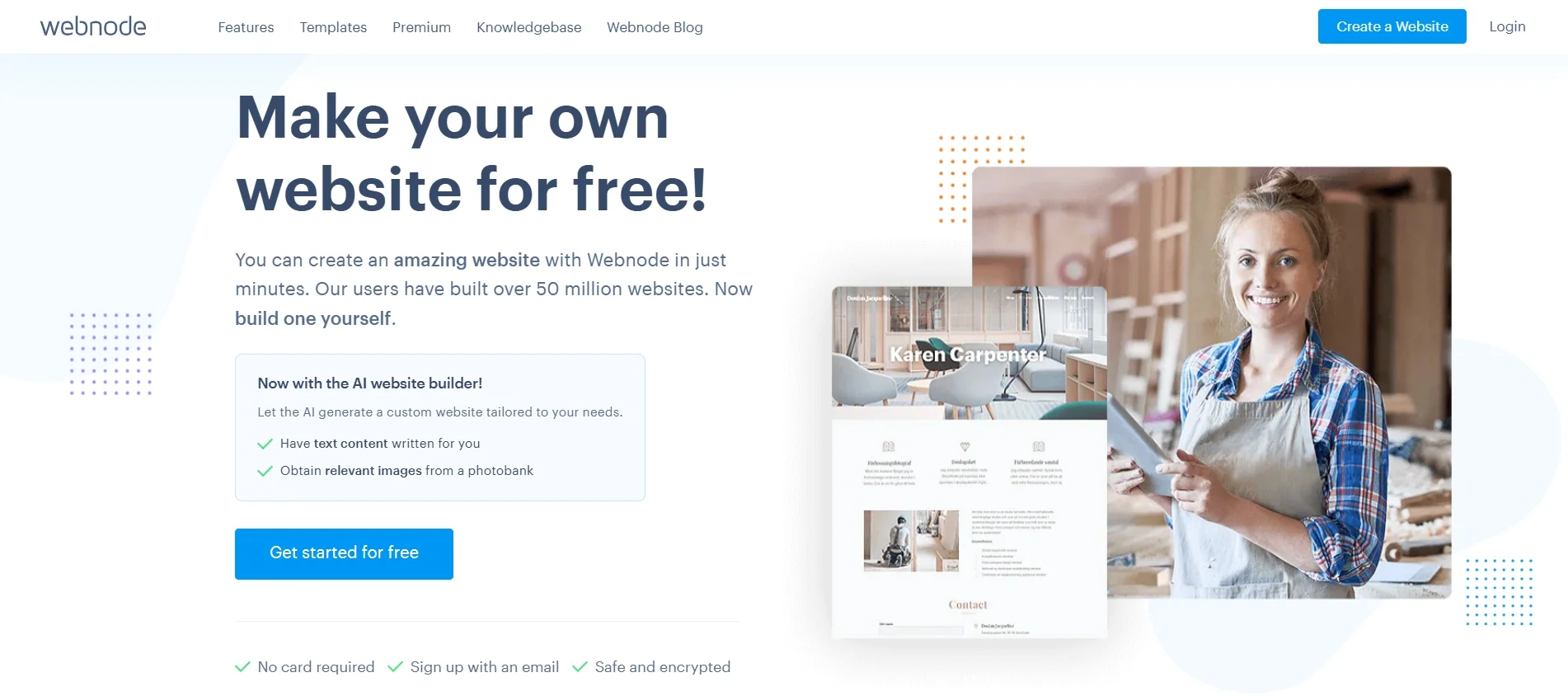
Webnode is a simple website builder that focuses on speed and ease of use. It’s perfect for users who want to get online fast without spending a lot of time learning complex tools. This platform equips users with basic customization, a decent set of templates, and standard eCommerce capabilities to start selling online. For a detailed overview of Webnode and all the features it offers, please check out our in-depth Webnode review.
In short, I would recommend Webnode for:
- Personal websites or small portfolios that need a simple drag-and-drop builder.
- Small businesses that don’t need many extra features.
- Beginners want to set up their sites quickly without any technical hassle.
Wix, on the other hand, is one of the most popular and powerful website builders out there. Founded in 2006, Wix has made its name among the best eCommerce platforms out there, currently hosting over seven million websites worldwide, according to statistics from BuiltWith. This platform also earns good ratings from users, with an impressive 4.5 out of 5 on Trustpilot and 4.4 out of 5 on Capterra.

Wix offers hundreds of beautifully designed templates, a flexible drag-and-drop editor, and a large app market to extend your site’s functionality. From blogs and portfolios to full-scale online stores, Wix can handle it all. But to be honest, while this platform gives users more creative freedom, it might also feel overwhelming at first.
I would recommend Wix for:
- Creatives, freelancers, and entrepreneurs who want a professional look with full design control and flexibility.
- Online store owners who want good eCommerce features and advanced tools to grow.
Overall, if you prefer a clean, easy experience and don’t need a ton of extras, Webnode could be the right fit. But if you want to unlock advanced features, customization, and growth potential, I believe Wix offers a more complete solution.
Now that you have an overview of these platforms, let's scroll down for the detailed comparison of Webnode vs Wix.
Pricing – Webnode Wins
When comparing Webnode vs Wix, pricing is one of the most important factors for many users, especially beginners or small businesses with limited budgets. In this section, let's break down how Wix and Webnode differ in their pricing packages and which solution is more affordable.
Webnode pricing
Webnode offers two main types of premium plans: Website Plans for general sites and E-commerce Plans for online stores.
The Website Plans start with the Limited Plan at $4.50/month, which lets you connect your own domain but offers minimal features. The Mini Plan at $8.50/month adds 1 GB of storage and an email account, while the Standard Plan at $12.90/month is ideal for most users. It includes 3 GB of storage, 20 email accounts, and support for two languages. For more advanced needs, the Profi Plan at $22.90/month includes unlimited multilingual support, 100 email accounts, analytics tools, and video backgrounds.
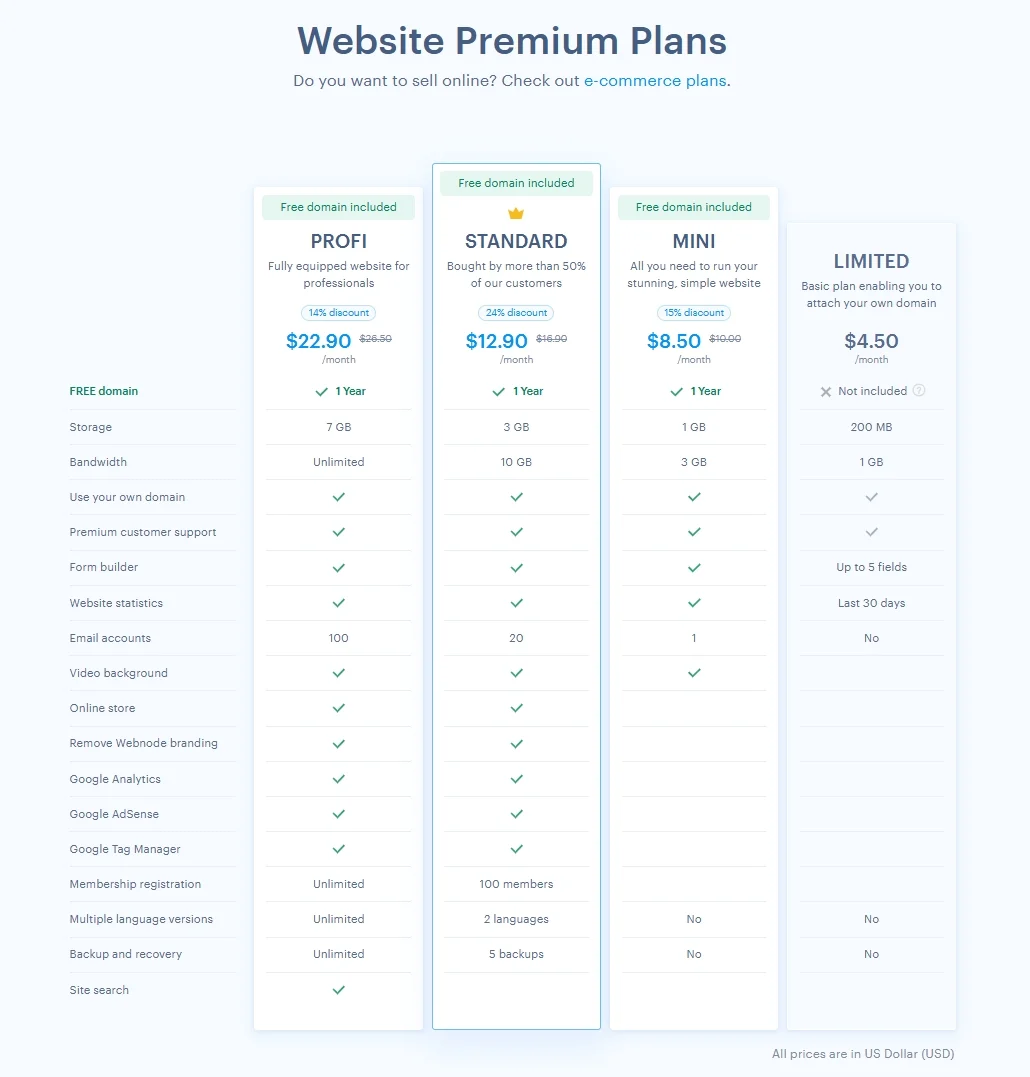
On another note, the E-commerce Plans are designed for selling products online. The Standard eCommerce Plan starts at $12.90/month with basic store features and support for 100 members. The Profi Plan at $22.90/month adds international shipping, product analytics, and unlimited members. At the top, the Business Plan at $31.90/month includes 15 GB of storage, 1000 email accounts, advanced invoicing, and order editing.
Overall, I think Webnode’s pricing is very competitive. Even at lower tiers, you get great value, like free domains, multilingual support, and email hosting, without the steep pricing you often find with other platforms.
Wix pricing
Now, let's move on to Wix pricing. This platform offers five main premium plans, each targeting different types of users, from beginners to large businesses. However, after using Wix myself, I found that its pricing is considerably higher than Webnode’s, especially when you start unlocking the tools needed for professional websites or online stores.
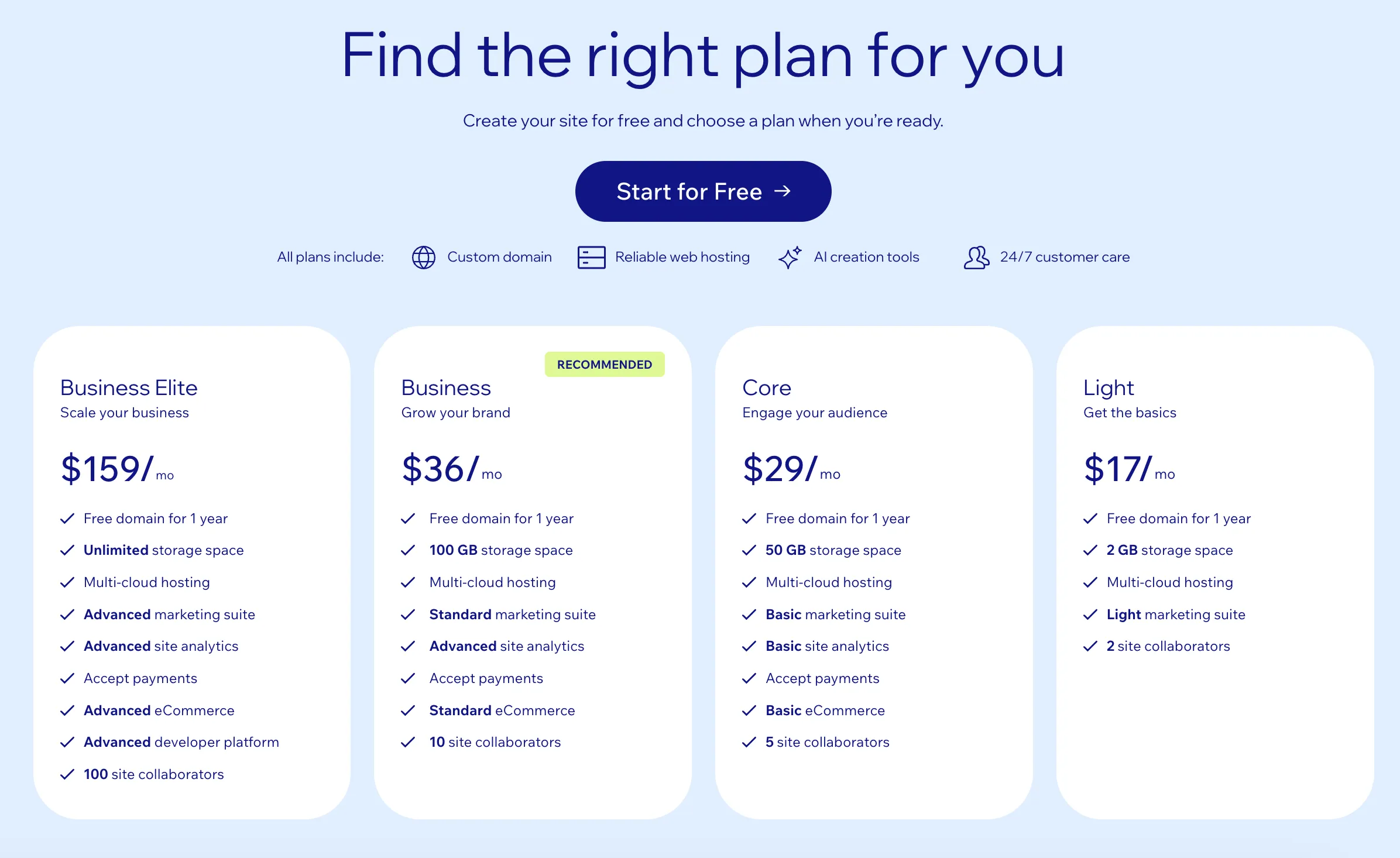
Here's a breakdown of what each plan offers:
- The Light Plan costs $17/month and includes a free domain, 2 GB of storage, and basic marketing tools. It’s suitable for simple websites but has limited storage and features.
- The Core Plan, at $29/month, adds 50 GB of storage, payment support, and basic eCommerce tools. It’s a good fit for freelancers or small businesses starting to sell online.
- The Business Plan ($36/month) is the recommended option. It includes 100 GB of storage, standard eCommerce, and a more advanced marketing suite. It also allows for 10 collaborators, making it ideal for growing teams.
- At the top is the Business Elite Plan, priced at $159/month. It offers unlimited storage, advanced eCommerce and marketing features, and supports up to 100 collaborators, making it perfect for large-scale businesses.
From my experience, while Wix delivers strong functionality, its pricing is on the higher end and better suited for those who are ready to invest in a scalable, feature-rich platform. For casual users or those with basic needs, the pricing may feel steep, especially when compared to Webnode’s more affordable tiers.
⇒ The verdict
When it comes to pricing between Webnode vs Wix, I believe Webnode is the winner here, especially if you're looking for a budget-friendly website builder to launch a simple site or portfolio. Its plans are easier to understand, and the cost stays low, even when you need premium tools.
Ease of Use: Webnode Wins
One of the biggest factors when choosing a website builder is how easy it is to use, especially if you’re new to creating websites. Therefore, in my Webnode vs Wix review, I'll share my experience on how simple it is to get started, how intuitive the editor fell, and how smoothly I could build and publish a website.
Webnode: Clean interface and effortless setup
Webnode offers a very straightforward setup process. As soon as I signed up, I was guided through a few quick steps to choose a template and set up the basics of my website. The interface is minimal and intuitive, with no sign of advanced or technical options, which is great if you just want to build a site quickly. I was completely amazed by how fast it was to build a clean, professional-looking website without needing any tutorials or external help. Everything is labeled clearly, and the dashboard is clutter-free, which eliminates all the confusion.
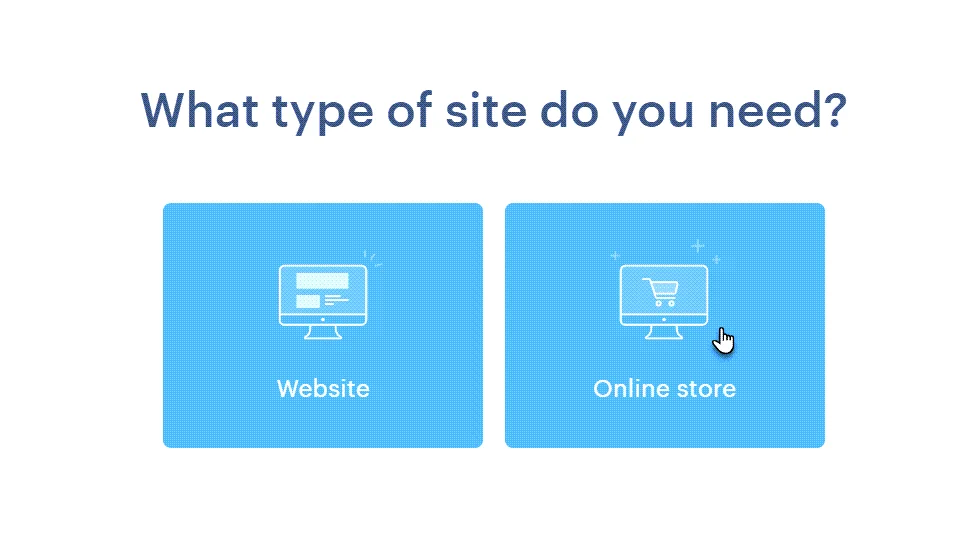
Editing with Webnode is also smooth. This platform uses a structured block-based system, keeping the design consistent and preventing layout mistakes. I could easily click on any section to edit text, swap images, or add new content. The left-hand menu is minimal, offering only the essentials like pages, design settings, and SEO tools.
Overall, though it seems like Webnode comes with limiting advanced features, it's still a big win for users who just want to keep things clean and minimal for a quick website setup.
Wix: More creative with steeper learning curve
Now, let's move to the other side of the Webnode vs Wix comparison pair. Wix takes a very different approach, offering three main types of Wix website builders, including ADI, Editor, and Studio. Since the Studio version is mostly for agencies building sites for their clients and the ADI is pretty simple to set up, I spent most of my time experiencing and exploring the Wix Editor.
To be honest, I was blown away by the incredible features that this builder offers. It allows me to move elements pixel by pixel, adjust every part of your site’s layout, and add animations, overlays, and more. I have total freedom and control to customize fonts, colors, menus, and backgrounds. There’s also a massive range of widgets, third-party apps, and advanced tools available through the Wix App Market, so I can plug-and-play any solution that I like.

But I have to say that this power comes at a price. The interface is quite crowded, with dozens of icons, toolbars, and menus. For someone without experience, it can be overwhelming to learn how to use certain tools rather than actually building the site.
In short, Wix offers advanced control, but it might become too complex. It’s best suited for people who don’t mind investing time into mastering the platform or who have specific design requirements.
⇒ The verdict
Webnode takes the lead when it comes to ease of use between Webnode vs Wix. This platform is faster to set up, easier to understand, and more forgiving for beginners. Everything works out of the box, and the design stays consistent without much effort.
Design & Customization: Wix Wins
Next, let's talk about visual design and customization options. In this part, I'll break down all the differences between Webnode vs Wix in design capabilities.
Webnode: Clean but limited
Webnode provides a clean and simple selection of templates with around 200 options. All these website templates are free, which is ideal for those who are on a tight budget or want to cut costs. However, I must say that even though Webnode templates are mobile responsive and easy to use, they don’t offer much in terms of customization.
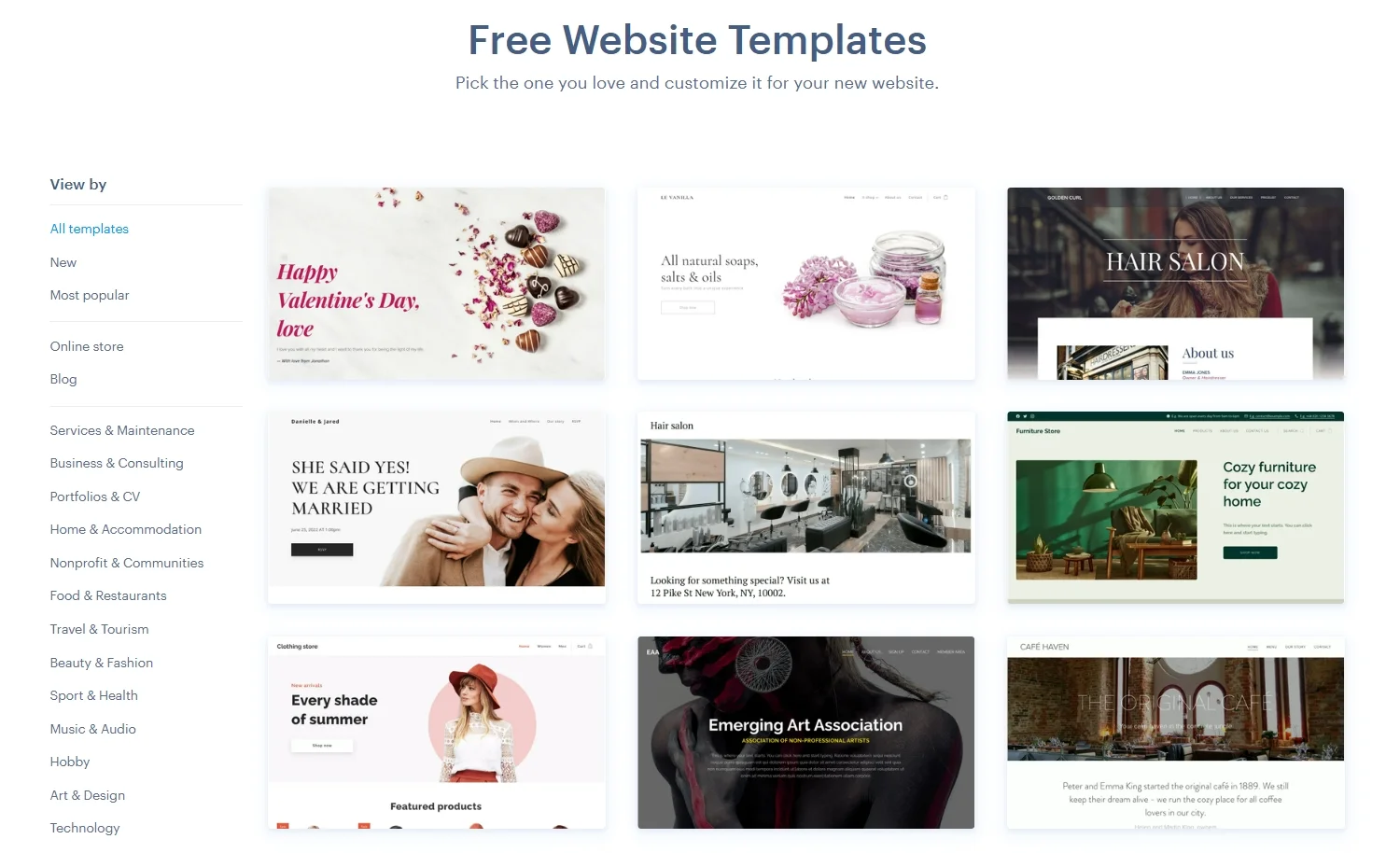
Once you select a template, you’re somewhat locked into its structure. You can change text, images, sections, and colors, but your control is mostly limited to the layout you start with. It doesn't allow you to drag elements freely or change column widths and alignments like you can in Wix. While this keeps your design organized and safe from mistakes, it also means you’re limited in how much you can personalize your site.

To conclude, Webnode can get the job done well for users who just need a basic website with a professional look. Yet, for creatives, designers, and businesses that want to stand out visually, Webnode may feel too rigid.
Wix: Total creative freedom
Meanwhile, Wix, Webnode's counterpart in the Webnode vs Wix comparison, stands out for its design tools. This platform offers over 800 professionally designed website templates, covering several purposes such as businesses, online stores, creativity, or blogs. Each template is professionally designed and mobile-ready, so you can start with something beautiful right out of the box.

But what really impressed me is how customizable everything is. Using the Wix Editor, I was able to drag and drop elements anywhere on the page with no fixed grids or layout restrictions. You can change every part of the design, from font styles and sizes to background images, animations, button shapes, and even the way elements interact with each other on scroll.
Wix also includes advanced options like scroll effects, video backgrounds, and parallax animations, features that add a professional look and feel to your website without needing any coding skills. If you're a designer or someone with a specific vision for your website, you'll love how much control Wix gives you.
⇒ The verdict
In the Webnode vs Wix comparison on design and customization, Wix is the obvious winner if you care about having full control over how your website looks and behaves. It offers unmatched flexibility, a massive template library, and powerful editing tools that let you create virtually any style of website.
eCommerce Tools: Wix Wins
If you’re planning to sell products or services online, the quality of the eCommerce tools that your website builder provides is absolutely critical. And that's the next criteria that I'll break down in today's Webnode vs Wix comparison.
Webnode: Basic eCommerce functionality
Webnode’s eCommerce capabilities are designed for small-scale sellers who want to set up a functional store without dealing with complicated features. You can quickly access its store features directly from the storefront; there's no need to install any software or integrate with other third-party apps.
Here's what I was able to do with Webnode's e-shop tools:
- Add products with titles, images, and short descriptions.
- Set product variants like size or color, though this feature is available only for the Profi and Business plans.
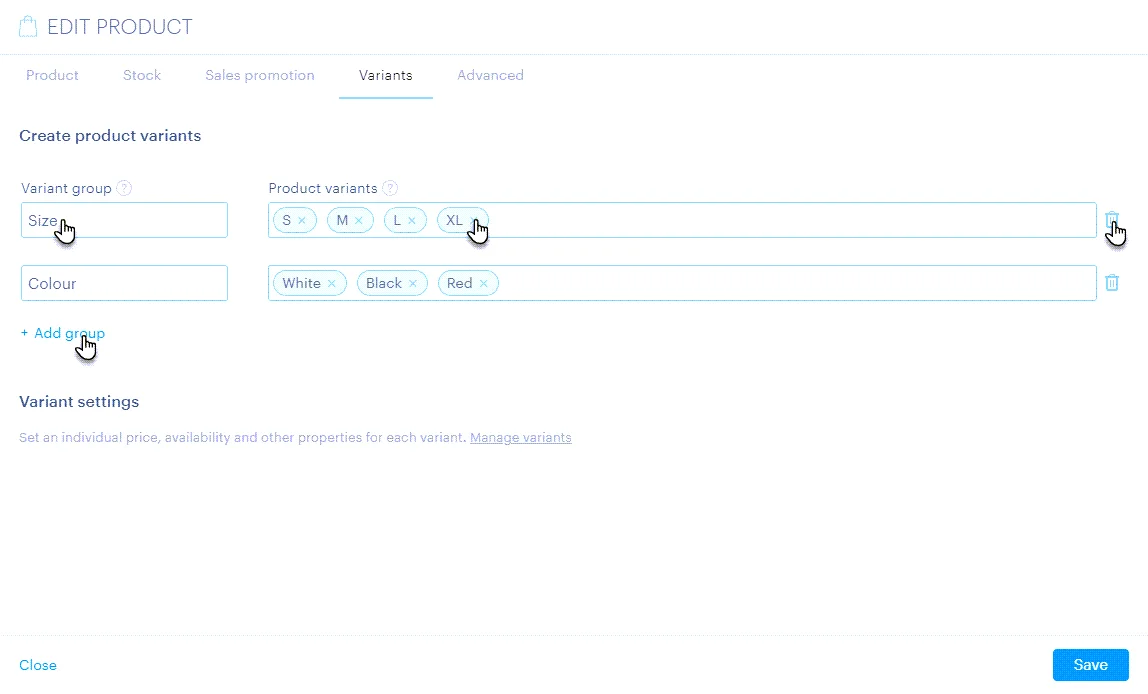
- Track inventory manually with simple stock level settings.
- Accept online and offline payments, even though the selection of payment gateways is quite limited.
- Manage orders through a simple interface and export data manually.
- Configure flat-rate shipping rules, though it lacks integration with live shipping calculators or fulfillment partners.
- Offer a multilingual and multi-currency shopping experience, which I found especially useful if you’re targeting multiple markets.
To be honest, though Webnode offers a sufficient set of eCommerce features, it lacks the advanced selling tools that you need to scale. For example, there’s no abandoned cart recovery, automated tax settings, or app integrations. Larger businesses would quickly feel restricted with the basic features that Webnode equips.
In short, Webnode is best suited for solo entrepreneurs or small shops that sell a few products and want a simple checkout experience. It’s a great start for beginners but not ideal for scaling a serious online business.
Wix: Robust features for eCommerce Growth
In contrast, Wix eCommerce tools are on a different level. This platform is built with online sellers in mind, allowing you to sell both physical and digital products, manage inventory, accept secure payments, and customize the entire shopping experience.
During my test on Webnode vs Wix, I was able to:
- Sell physical items, digital downloads, services, and even subscriptions, all from the same dashboard.
- Integrate with major gateways like PayPal, Stripe, Wix Payments, and many regional gateways, plus offline payments.
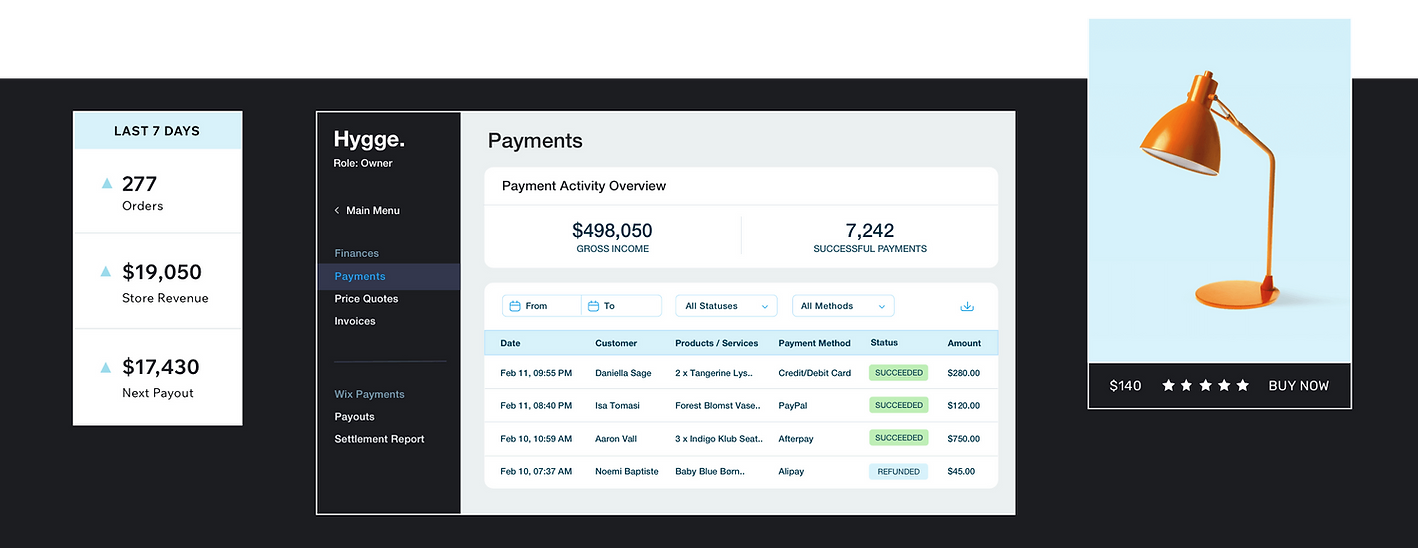
- Manage inventory efficiently with full control over product variants, with options for color, size, and SKU tracking.
- Create automated tax rules, set shipping by region or weight, and connect to tools for live shipping rates.
- Leverage several built-in marketing tools to generate coupons, discounts, and promotional banners.
- Integrate with powerful tools for dropshipping, CRM, customer chat, loyalty programs, and even multichannel selling through the Wix App Market.
Overall, Wix gives you a fully functional eCommerce toolkit, with the help of a large app market to make up for any missing feature.
⇒ The verdict
Between Webnode vs Wix in the eCommerce criteria, Wix is no doubt the better choice. With its powerful store management system, deep customization, and integration with marketing and analytics tools, Wix gives you everything you need to build your store and scale up.
Apps & Integrations: Wix Wins
As your website grows, you might need to install extra apps to boost your marketing, improve customer service, or streamline your sales process. Therefore, in this section of my Webnode vs Wix comparison, I'll take a closer look at how these platforms handle apps & integrations.
Webnode: Essentials yet limited
Webnode takes a minimalist approach to integrations. Most of its features are built directly into the platform, and while that keeps things simple, it also limits flexibility. Instead of integrating with a dedicated app store or plugin system, you’re mostly working with what Webnode gives you out of the box.
During my testing, I found that Webnode supports:
- Basic integrations like Google Analytics, Google Search Console, and Google Ads via code snippets.
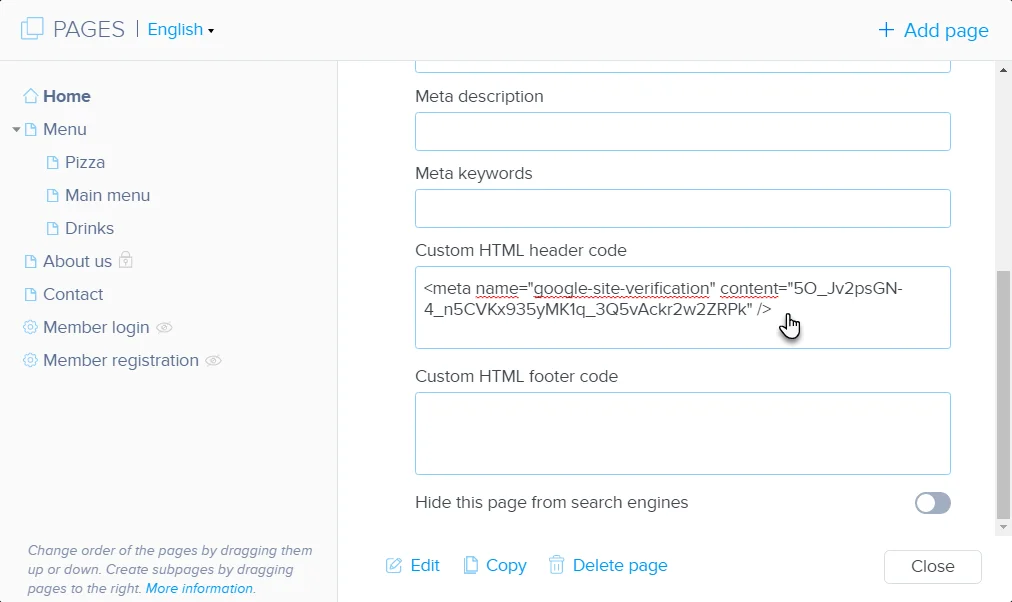
- Embedded HTML blocks, which you can use to add third-party tools manually (like chat widgets or calendars), but this requires some comfort with embedding code.
- Contact forms, social media links, and maps, but only with limited customization.
That’s about as far as Webnode goes. There’s no app marketplace, no direct integrations with CRM tools, email marketing platforms, or booking systems unless you manually embed external tools. For small or simple websites, this might be enough. But for businesses looking to automate workflows or add advanced functionality, it’s too limiting.
Wix: Rich app ecosystem with deep integrations
Wix, on the other hand, truly stands out for its ability to grow with your website through a wide selection of Wix apps and third-party integrations. What impressed me the most during testing was the Wix App Market, which offers over 500 apps that can be added to your site with just a few clicks and no coding required.

These apps cover a wide range of purposes, from marketing, selling online, services & events to design elements. Many of these apps offer free plans or trials, so you can experiment before making a long-time commitment.
Another big advantage is Velo by Wix, the platform’s built-in web development tool. It lets advanced users create custom applications, connect external APIs, and build dynamic web content directly within the Wix interface. This is a huge bonus for developers or businesses with unique needs.
Simply put, Wix gives you the freedom to expand and customize your site however you want, whether you're just starting out or managing a growing online business. With everything from booking systems to loyalty programs, Wix’s app ecosystem is one of the most complete among all website builders.
⇒ The verdict
Between Webnode vs Wix in terms of apps and integrations, Wix is clearly in a different league. It provides a wide variety of built-in tools and a massive app marketplace that allows you to expand your website’s functionality in just a few clicks.
Security: Wix Wins
When building a website, security isn’t just a technical detail; it’s essential. Whether you’re collecting customer data, processing payments, or simply maintaining your brand’s reputation, your site needs to be safe and reliable. Hence, in this part of my Webnode vs Wix comparison, let's see what security features these platforms have to offer.
Webnode: Covers the essentials
Webnode offers solid, entry-level security features that are suitable for most small websites. You'll get a free SSL certificate out of the box, which means that visitor data is encrypted and secure. Additionally, all websites created with Webnode are hosted on secure servers with regular maintenance, ensuring decent uptime and protection against basic threats.
Webnode is GDPR-compliant, which is important if you’re serving users in the EU. The platform also allows you to create privacy policies and cookie consent notices to help meet regulatory requirements.
However, Webnode doesn’t offer much transparency or control over deeper security settings. There are no built-in tools for backups, DDoS protection, or firewall management, and no two-factor authentication (2FA) for account protection. While it's safe for small websites, it may not meet the needs of larger or data-sensitive businesses.
Wix: A comprehensive approach to security
Meanwhile, Wix takes website security much further. All Wix sites come with SSL certificates by default, ensuring data encryption for every visitor. This platform also uses multi-cloud hosting (including AWS, Google Cloud, and its own infrastructure) to provide 99.98% uptime, automatic scaling, and reliable performance.
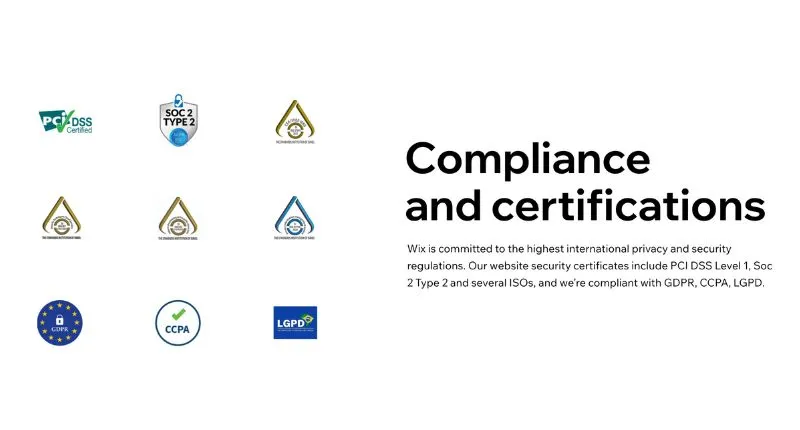
Wix also provides users with role-based permissions, which is especially useful if you manage your site with a team. You can assign different roles like Admin, Editor, or Contributor to keep your site secure from internal risks.
What really sets Wix apart is its advanced security infrastructure, including:
- 24/7 monitoring and threat detection to identify and block suspicious activity.
- DDoS protection is built directly into its network, reducing the risk of site outages from attacks.
- Automatic backups and version history that allow you to restore your site to a previous state in just a few clicks.
- Two-factor authentication (2FA) for account-level protection, which is something Webnode doesn’t currently offer.
- Full compliance with global standards such as GDPR, PCI DSS (for payments), and ISO/IEC 27001.
⇒ The verdict
When it comes to security between Webnode vs Wix, Wix goes several steps further. With advanced features like automatic backups, DDoS protection, multi-cloud hosting, and account-level 2FA, Wix gives you peace of mind, especially if you’re handling sensitive information or running a business.
Support: Webnode Wins
In this section of my Webnode vs Wix comparison, let's see how easy it was to get help, how responsive the support teams were, and how helpful the resources were on both platforms.
Webnode: Fast, helpful, and personal
Webnode might be a simpler platform, but its support quality is impressive. Users can get help through email support, and in my experience, response times were surprisingly quick. I received clear, direct answers to my questions, usually within a few hours, which is faster than I expected from an email-based system.
One thing I appreciated was how personal the support responses felt. They weren’t copied-and-pasted answers or automated replies; they were written by real people who clearly understood the problem. Webnode doesn’t currently offer live chat or phone support, but the email support was fast and effective enough to make up for it.
Additionally, Webnode offers a detailed Help Center with guides, FAQs, and step-by-step tutorials. It covers all the basics: setting up a domain, using the editor, launching an online store, and more. The platform is so user-friendly that most people won’t need much help, but it’s nice to know responsive support is available when needed.
Wix: More channels, less personal
Wix provides a wide range of support options, including a Help Center, chatbot, email ticketing system, and phone callback service for premium users. On paper, this looks great. However, after testing it myself, I found that while Wix offers more channels, the support experience isn’t always smooth or personal.
To speak with a real person, you often have to go through a series of automated prompts or help articles, which can be time-consuming, especially if your issue is urgent. Even when I used the callback option, the waiting time was longer than expected, and I sometimes had to re-explain my issue to different agents.
That said, Wix’s Help Center is extremely detailed. It includes hundreds of tutorials, how-to guides, videos, and troubleshooting articles covering everything from design tips to advanced eCommerce setups. For users who prefer to solve problems independently, this is a valuable resource.
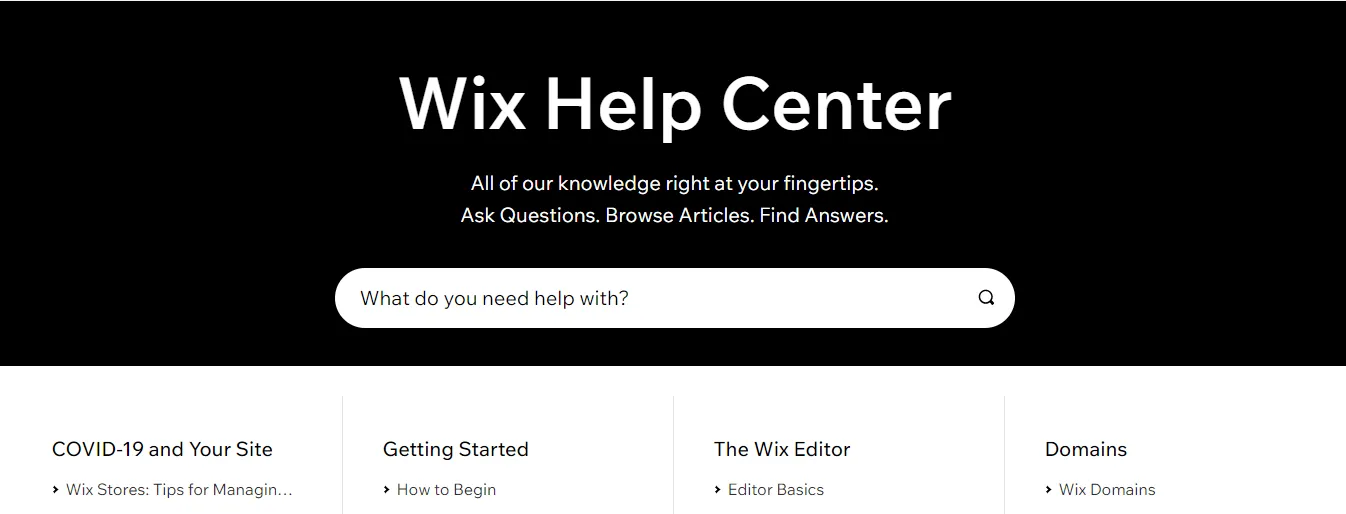
⇒ The verdict
Even though Wix offers more support channels, Webnode takes the lead when it comes to quality and responsiveness. Their email support team is quick, knowledgeable, and genuinely helpful. For users who value straightforward, personal support without navigating bots or complex menus, Webnode delivers a better experience.
Webnode vs Wix – FAQs
What is Webnode used for?
Webnode is a website builder designed for users who want a quick, easy, and code-free way to build a website. It’s commonly used for personal websites, small business sites, portfolios, blogs, and even basic online stores. One of Webnode’s standout features is its built-in support for multilingual websites, making it a strong choice if you're targeting international visitors.
If you're looking for a simple platform that focuses on ease of use and fast setup, Webnode is a great option.
What is the downside to Wix?
While Wix offers powerful tools, flexibility, and design freedom, its biggest downside is that it can be overwhelming for beginners. The editor is packed with features, which can lead to a steeper learning curve. Additionally, many of Wix’s best features—like advanced analytics, eCommerce tools, and ad removal—are locked behind higher-priced plans.
Another limitation is that once you choose a template in Wix, you can't switch to a different one later without rebuilding your site, which might frustrate users who want flexibility in the future.
Is Webnode for free?
Yes, Webnode does offer a free plan that allows you to build and publish a basic website using a Webnode subdomain (e.g., yoursite.webnode.com). This free plan includes limited features, such as basic templates and 100 MB of storage. It’s a good starting point for testing the platform or creating a personal site, but you’ll need to upgrade to a paid plan if you want to use a custom domain, get rid of ads, or access more storage and features.
Should I choose Wix?
You should choose Wix if you’re looking for a website builder that gives you maximum control over design, strong eCommerce tools, and a huge app marketplace. It's an excellent choice for creatives, entrepreneurs, online sellers, and anyone who wants to build a highly customized size.
Webnode vs Wix – Final Verdict
After carefully testing and comparing Webnode vs Wix across all key areas, I must say that both platforms have their strengths and weaknesses. Therefore, the right platform depends on your priorities and goals.
If you’re looking for a simple, affordable, and beginner-friendly website builder, Webnode is a great choice. It’s ideal for users who want to launch a basic website quickly, especially if you’re building a personal site, portfolio, or small business presence. Webnode also stands out for its responsive customer service, which makes it a good fit for users who value straightforward tools and clear assistance.
On the other hand, if you want creative freedom, professional features, and room to grow, Wix is the better option. It gives you everything you need to build a modern, high-performing website, but it also comes with a higher learning curve and cost.
And that brings us to the end of my comparison on Webnode vs Wix. I hope this article has provided a clear overview of what these platforms offer and which best suits your needs. If you like this blog, don't forget to check out other articles on our LitExtension website for more expert tips and insights.
